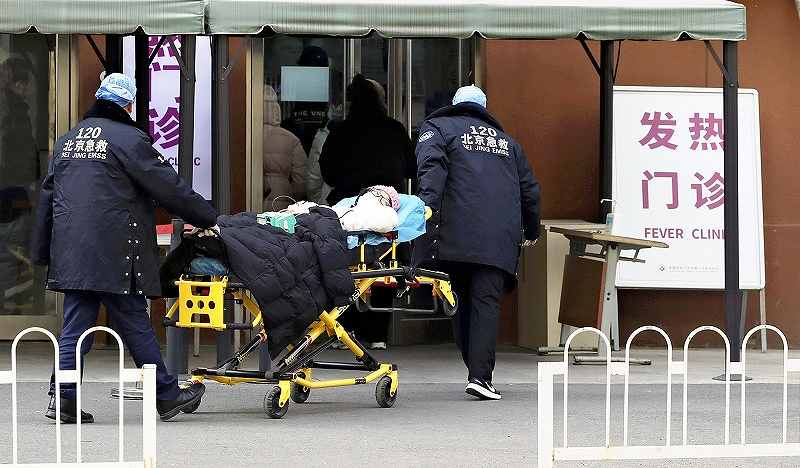
A person is brought into a fever outpatient clinic at a hospital in Beijing on Thursday.
17:02 JST, December 17, 2022
BEIJING / SHENYANG — The end of China’s zero-COVID measures is likely to dampen its economy for some time, as the abrupt policy change has unleashed a rapid spread of infections, with an increasing number of factories consequently forced to slow down.
Although the Chinese government shifted its zero-COVID policy in the middle of this month, allowing companies to operate at will, the rapid spread of infections has begun to cast a shadow over the production of Japanese companies as well.
According to Renesas’ public relations, the reason for the shutdown was to ensure stable operations as well as to protect the safety and peace of mind of its employees.
The company has been short of manpower due to the spread of infections, making it difficult to maintain the production line, it said. It initially will shut down operations for a few days and will consider later whether or not to extend the shutdown should the number of infected people not decrease.
Renesas had not shut down a factory in China for a specified period of time since January-February 2020, when the pandemic first broke out. The Beijing plant, with about 1,000 employees, is mainly involved in the production of semiconductors for home appliances, industrial equipment and automobiles, which are shipped to companies in Japan and elsewhere.
The number of infected people has rapidly begun to increase in Beijing, Shanghai and other major cities since November. Chinese media have reported that the peak of the infection is expected to come within one month.
With expectations that the shutdown at Renesas will likely be protracted.
In Dalian, in the northeastern part of the country, 27 people were infected at a factory of a Japanese affiliate, leaving 10% of the approximately 1,000 employees unable to go to work and slowing down the operations of its production line.
At another Japanese company in the same city, nearly 20% of employees have been unable to come to work.
In mid-December, the Chinese government reversed its zero-COVID policy, which prioritized containment of the outbreak. The new policy was intended to give priority to economic activity in order to restore the stagnant economy.
Yet, this policy has actually led to an increase in the number of infected people, highlighting the fact that it will not be easy to restart the economy.
Top Articles in Business
-

Prudential Life Insurance Plans to Fully Compensate for Damages Caused by Fraudulent Actions Without Waiting for Third-Party Committee Review
-

Narita Airport, Startup in Japan Demonstrate Machine to Compress Clothes for Tourists to Prevent People from Abandoning Suitcases
-

Japan, U.S. Name 3 Inaugural Investment Projects; Reached Agreement After Considerable Difficulty
-

Toyota Motor Group Firm to Sell Clean Energy Greenhouses for Strawberries
-

SoftBank Launches AI Service for Call Centers That Converts Harsh Customer Voices into Softer Voices
JN ACCESS RANKING
-

Japan PM Takaichi’s Cabinet Resigns en Masse
-

Japan Institute to Use Domestic Commercial Optical Lattice Clock to Set Japan Standard Time
-

Israeli Ambassador to Japan Speaks about Japan’s Role in the Reconstruction of Gaza
-

Man Infected with Measles Reportedly Dined at Restaurant in Tokyo Station
-

Videos Plagiarized, Reposted with False Subtitles Claiming ‘Ryukyu Belongs to China’; Anti-China False Information Also Posted in Japan























